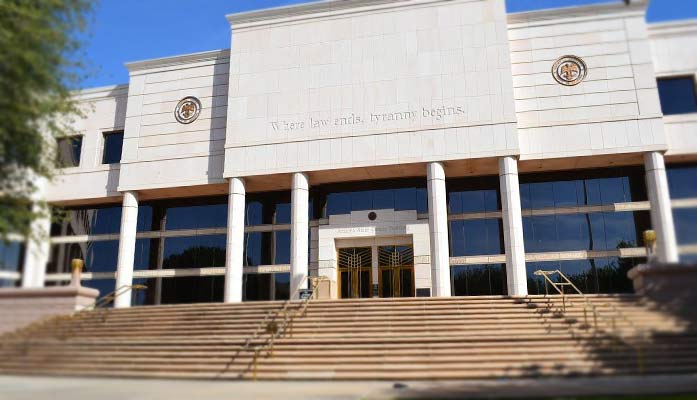By Terri Jo Neff |
The Arizona Supreme Court issued a unanimous opinion Tuesday finding that the Town of Marana violated state law by assigning the entire cost of upgraded and expanded wastewater treatment facilities to future homeowners through development impact fees.
The fees were challenged by the Southern Arizona Home Builders Association (SAHBA) under Arizona Revised Statute 9-463.05 due to the fact that existing Marana residents also benefited from the improved facilities.
The opinion authored by Justice Clint Bolick reverses a Pima County Superior Court decision and sets aside an Arizona Court of Appeals decision, both of which sided with Marana.
According to Bolick’s opinion, town officials violated state law by requiring new residents to bear the entire cost of the expanded and improved services and facilities. Instead, the statute required a proper allocation of costs be conducted through a “discrete, evidence-based findings of fact” that took into consideration the benefit to existing residents.
The case now goes back to a Pima County judge for further proceedings, at which SAHBA will be free to argue that certain expenses should not be included in development fees at all, while Marana officials may argue that certain expenses pertain exclusively to new development.
This could lead to no change to the development fees or an order for recalculation of those fees.
Court records show that until 2012, Pima County provided sewer and water service to residents of the Town of Marana. That year, after five years of effort, the town obtained operational control over a wastewater reclamation facility (WRF) from Pima County, assuming the facility’s roughly $16.4 million in outstanding debt.
In 2013, Marana acquired legal title to the WRF, including the infrastructure, land, and exclusive rights to the facility’s effluent. Owning the effluent contributes to the 100-year assured water supply required for new development, as it can be used to recharge the aquifer.
Town officials then voted to issue 20-year bonds with an annual debt service of $1.8 million to finance the acquisition of the WRF. The Town also commissioned two infrastructure improvement plans, which assigned half of the acquisition costs to future water customers and the other half to future sewer customers.
Those costs would be paid in the form of development impact fees.
The WRF’s output was initially limited to 380,000 gallons per day (gpd) but the capacity was up to 500,000 gpd by 2017 when town officials approved a Capital Improvement Project encompassing “multi-phase expansion and upgrades” to the water and sewer systems.
Phase 1, which was the subject of SAHBA’s litigation, was undertaken to increase the WRF’s capacity to 1.5 million gpd to serve both existing residents and anticipated development. It also brought Marana into compliance with the Class B+ water quality standard required by its Aquifer Protection Permit.
New water and sewer impact fees were also adopted by Town officials in 2017, still assigning 100 percent of the debt service to future water and sewer customers via development impact fees.
As previously reported by AZ Free News, SAHBA initiated its lawsuit in 2018 seeking a declaratory judgment that the development fees violated ARS 9-463.05 by disproportionately imposing the WRF and Phase 1 expenses on future developers even though current residents were also benefitting from the improvements.
In response, the Town’s attorneys argued the development fees were valid because the expansion and improvements were undertaken to serve future development. A Pima County judge agreed and granted summary judgment in favor of the Town.
According to the judge, “the Town’s chief goal in acquiring the WRF was to obtain its effluent as a water resource in order to secure recharge credits towards water rights as a means for sustaining growth by having access to a 100-year designated water supply.”
The Arizona Court of Appeals affirmed the lower court decision, ruling it was irrelevant that any upgrades and modernization to the WRF would also benefit existing residents.
The Town’s attorneys then went on to oppose having the Arizona Supreme Court consider the case, calling such review “unwarranted.” But the justices announced in April 2022 it would hear the matter, noting the case presented unresolved issues of statewide importance.
Tuesday’s opinion notes the court of appeals “committed two principal errors” in upholding the lower court’s decision in favor of Marana. First was applying a presumption that the Town’s assessment of development fees was valid. Second, the appellate court took the position that the WRF project was “entirely” for purposes of new development, even though Marana officials conceded some costs would benefit existing residents.
“In sum, we conclude that the Town violated § 9-463.05 by making future development bear 100% of the cost of acquiring the WRF; by making future development bear nearly all the cost of upgrading, modernizing, and improving the facility; and by failing to determine what could or could not be included in development fees or to make any proportionate allocation of costs between existing and future development,” the opinion states.
Terri Jo Neff is a reporter for AZ Free News. Follow her latest on Twitter, or send her news tips here.








